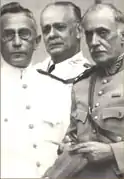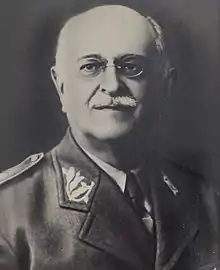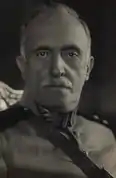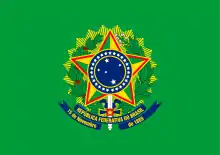Brazilian Military Junta of 1930
The Provisional Government Junta of Brazil (Portuguese: Junta Governativa Provisória) was an administrative body that governed Brazil between the ousting of President Washington Luís and the oath of Getúlio Vargas (October 24–November 3, 1930). The junta of 1930 is sometimes referred to as the First Junta, as a second military body governed Brazil in 1969.
The junta took power via a coup at the end of the Brazilian Revolution of 1930. The junta included General Augusto Tasso Fragoso, Admiral Isaías de Noronha, and General Mena Barreto, key players in the coup.
Background
Throughout the First Brazilian Republic (1889–1930), the Brazilian presidency was interchanged between the states of Minas Gerais and São Paulo.[1] By using their power and influence as key economic states of the country and manipulating elections, the two states developed a system called "coffee with milk politics" (coffee being São Paulo's largest industry and dairy, milk and cream being Minas Gerais's largest), effectively making Brazil an oligarchy with power concentrated in the two states.[1] This system was opposed by tenentes (English: lieutenants), but their attempted revolts throughout the 1920s proved unsuccessful.[2]
This tradition was broken when, in 1929, paulista (person from São Paulo) President Washington Luís nominated paulista Júlio Prestes as the next President of the country, making for a paulista President twice in a row rather than exchanging the position with Minas Gerais.[3] This move was opposed by the states of Minas Gerais, Paraíba, and Rio Grande do Sul, who, backed by the tenentes, created a "liberal alliance" and nominated Getúlio Vargas for the presidency.[3] Prestes won the 1930 election against Vargas, but the alliance claimed electoral fraud.[3] The tension between the two factions resulted in a revolution beginning on October 3, 1930, while Luís was still in power.[3]
The junta

Overthrow of Washington Luís
Luís was persistent in his fight to stay in office so that he could transfer power to Prestes, but the military generals in Rio de Janeiro believed the President's continued presence would lead to a civil war in the country.[3] Following the advice of Cardinal Dom Sebastião da Silveira Cintra, Brazil's archbishop, Luís resigned, and the military generals who ousted him, General Augusto Tasso Fragoso, General Mena Barreto, and Admiral Isaías de Noronha, assumed power on October 24, 1930.[3][4][5][6] The President would be taken to Fort Copacabana and would leave Brazil for exile a few days later.[6]
A major rebel offensive was supposed to occur on the Paraná–São Paulo border, but was delayed due to bad weather from October 20 through October 24.[6] Just as the revolutionaries began a general offense in Itararé, they heard about the coup in the capital and the ousting of Luís, and so the revolutionaries called off the attack.[6]
Governing of Brazil
Fragoso, Barreto, and Noronha declared themselves a ruling junta of the country, despite the fact that the territory they controlled was limited to Rio de Janeiro.[5][7] They even considered remaining in power in the country rather than give power to Vargas and other revolutionaries.[7] The junta also appointed a Minister of War, a Chief of Capital Police, and a poorly–received Governor of São Paulo.[6]
Revolutionaries were surprised at the coup, as it had been done without previous notice. Vargas, in charge of the revolution, telegraphed on October 24:[6]
I am on the São Paulo border with thirty thousand men perfectly armed and acting in combination with the states of Rio Grande do Sul, Paraná, Santa Catarina, Minas Gerais and the north, not to depose Washington Luis, but to realize the program of the revolution...I am merely a transitory expression of the collective will. Members of the junta of Rio de Janeiro will be accepted as collaborators but not directors, since these elements joined the revolution at the time when its success was assured. Under these conditions, I will enter with the southern forces into the state of São Paulo, which will be occupied by troops I can trust. We will arrange the trip to Rio [de Janeiro] later. It is unnecessary for me to say that the march upon São Paulo and the subsequent military occupation is merely to guarantee military order. We have no desire to antagonize or humiliate our brothers from this state, who deserve only our esteem and appreciation. Before beginning our march for São Paulo tomorrow I want to hear any proposals that the junta may wish to make.
The junta responded to the messages on October 27, declaring that they would await the arrival of Vargas for any further action to be taken in arranging the government of Brazil.[6]
Arrival of Getúlio Vargas

Vargas claimed he would only arrive in Rio de Janeiro when it was occupied by Rio Grande do Sul troops. Consequently, from October 27 through October 31, 3,000 Rio Grande do Sul troops would enter and secure the capital.[6] Vargas and his comrades arrived in Rio on October 31 and, in a gesture of power, hitched their horses to the obelisk at the foot of Avenida Rio Branco, a famous Brazilian landmark.[7] The junta handed power over the country to Vargas on November 3, 1930 at the Catete Palace.[7][8]
References
- Meade 2010, p. 123.
- Roett 1992, p. 22.
- Skidmore 1999, p. 107.
- Levine 1970, p. 4.
- Hill 1947, p. 109.
- Young 1967, p. 66–69.
- Skidmore 1999, p. 108.
- Levine 1970, p. 1.
Bibliography
- Hill, Lawrence F. (1947). Brazil. Berkeley, California: University of California Press.
- Levine, Robert M. (1970). The Vargas regime: The critical years, 1934-1938. New York: Columbia University Press.
- Meade, Teresa A. (2010). A Brief History of Brazil. Infobase Publishing. ISBN 978-0-8160-7788-5.
- Roett, Riordan (1992). Brazil: Politics in a Patrimonial Society; Fourth Edition. Westport, Connecticut: Praeger.
- Skidmore, Thomas E. (1999). Brazil: Five Centuries of Change. United States: Oxford University Press.
- Young, Jordan M. (1967). The Brazilian revolution of 1930 and the aftermath. New Brunswick, New Jersey: Rutgers University Press.
| Political offices | ||
|---|---|---|
| Preceded by Washington Luís |
President of Brazil 1930 |
Succeeded by Getúlio Vargas |



